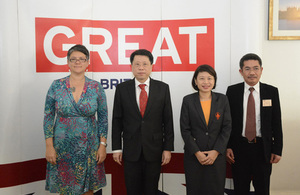UK and Thailand collaborate on teaching practice
The British Embassy Bangkok, in collaboration with The Teachers Council of Thailand, recently hosted a seminar and panel discussion showcasing best practice in teaching and teacher training.

Held at the British Ambassador’s Residence on 16 February 2018, the event brought together over 80 representatives from public and private universities, teaching specialists and thought leaders from across Thailand.
Welcoming delegates, Dr Teerakiat Jareonsettasin, Thailand’s Minister of Education, gave opening remarks thanking the UK and stressing the importance of the UK-Thai relationship, especially the ongoing cooperation on education, training and skills. He highlighted that educators were in a unique position to ensure the future prosperity of Thailand, ensuring students under their tutorage were equipped with the knowledge and skills needed for the economy.
Margaret Tongue, Deputy Head of Mission, British Embassy Bangkok, welcomed the Minister, the Teacher’s Council and all participants, emphasizing the importance of education systems that focus as much on the quality and consistency of education, as on the numbers of students graduating university. She noted the societal value in building upon the achievements of graduates, highlighting that:
The UK has a global reputation for educational excellence and teacher pedagogy, but we too are constantly looking for new and innovative ways to equip our children with the skills and expertise they need now and in the future.
The event was especially timely, converging around three key developments in teaching and teacher training in Thailand:
Firstly, Professor Chris Atkin, Bishop Grosseteste University, presented finding from a report on the ‘Thailand Rajabhat Initial Teacher Education’ project. This documented the outcome of fieldwork undertaken by Professor Atkin’s and his team during a study of five Rajabhat (teacher training) universities back in 2016. He set out the key recommendations from the study and welcomed questions and feedback from representatives of the Rajabhat network.
Secondly, the Teacher’s Council of Thailand launched the Southeast Asia Competency Framework for Teachers (SEA-CFT), a new rubric for teaching and teacher training in the region. The competency framework was recently approved by The Southeast Asian Ministers of Education Organisation (SEAMEO) after its High Officials Meetings in Bangkok in late November 2017. It establishes the first ever regional approach to teaching practice standardization in Southeast Asia – designed by and for teachers of the Southeast Asian countries signed up to it.
Finally, four subject matter experts representing universities from across the UK (Bishop Grosseteste University, University of Ulster, University of Aberdeen, and University of Leicester, took part in expert panel discussion. Here speakers drew from their wealth of experience and expertise to share their thoughts on a range of topics that mapped across both BGU’s Rajabhat University Report and the new Southeast Asia Competency Framework. Namely; knowing and understanding what to teach; helping students learn; engaging the community; and becoming a better teacher everyday.
Proceedings concluded with a lively Q&A session where participants had the opportunity to ask questions on the real-world application of the teaching competencies, techniques and approaches discussed throughout the day. This event marks an important milestone in ongoing UK-Thai collaboration on education, a relationship going from strength to strength.